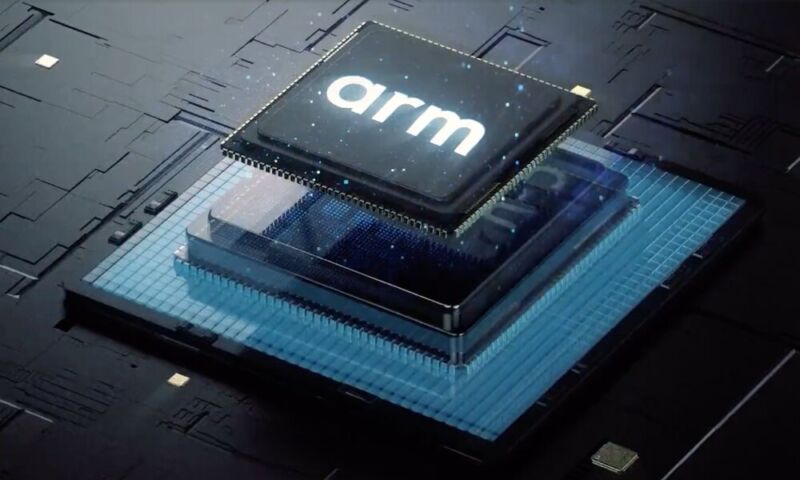What's in store for the future of chip maker Arm? The company's owner, Softbank, has been in financial trouble lately, and that has caused Arm to bounce from one dramatic possibility to another. Initially, Arm was put up for sale, and Nvidia was the front-runner to buy the company. That plan was shut down by regulators, and now "Plan B" is an IPO, which is supposed to happen on the New York Stock Exchange sometime this year. If you want to succeed on the stock market, you've got to show revenue, and while Arm enables the sale of billions of dollars of devices around the world, the company's chip licensing scheme only brings in a comparatively small amount of money—around $500 million a quarter.
The Financial Times has a report on Arm's "radical shake-up" of its business model. The new plan is to raise prices across the board and charge "several times more" than it currently does for chip licenses. According to the report, Arm wants to stop charging chip vendors to make Arm chips, and instead wants to charge device makers—especially smartphone manufacturers—a fee based on the overall price of the final product.
Let's say Motorola makes a phone with a Qualcomm Snapdragon Arm chip. Previously, Qualcomm would have signed a deal with Arm for an Arm license, and that license would extend to anyone that buys a Qualcomm Arm chip, like Motorola. Qualcomm contributes a lot to its own chip designs, but when it comes to the Arm license it is basically an Arm reseller. Arm would now want a licensing fee from Motorola (and not Qualcomm?), and it would ask Qualcomm to not sell chips to anyone that doesn't have a licensing agreement with Arm.
Our example isn't picking on obvious companies like Apple or Samsung because they have much more complicated deals with Arm. Those two are both chip vendors and device creators, and Apple doesn't even use Arm's designs, just an architecture license. Apple and Samsung will have their own licensing agreements in place, but it's hard to imagine Arm's new "Gotta impress Wall Street" strategy won't eventually affect them somehow.
Right now, Arm is talking this over with partners and the plan is to roll out the pricing changes in 2024, but we presume in-place contracts will keep some companies on the old model for a few more years. The report says, "MediaTek, Unisoc and Qualcomm, and multiple Chinese smartphone makers including Xiaomi and Oppo, are among the companies that have been made aware of the proposed change to pricing policy," later adding that Arm has been "frustrated by customers’ reluctance to accept the new arrangement."
A dream scenario for RISC-V
The report quotes a former senior employee as saying, “Arm is going to customers and saying, ‘We would like to get paid more money for broadly the same thing.’ What SoftBank is doing at the moment is testing the market value of the monopoly that Arm has.”
If customers decide they don't like Arm's new pricing structure, the competition is getting closer than it ever has before. While Arm is basically a mobile monopoly in everything smaller than a laptop, RISC-V is an upstart project that promises power-efficient chips under a royalty-free open source license. While Arm has an incredible amount of ecosystem support with device designs, a large user base, and a million developer tools, Arm's continual drama is making a switch to RISC-V look more worth the effort with each passing day.
With Arm being for sale and revamping its business model, the company has become an unstable partner for other businesses trying to plan their product lines years into the future. The US government's influence over Arm is also a concern for China, as is Arm's potential use as a weapon in the US-China trade war, which has led Chinese companies to rally around RISC-V as an alternative. Arm also decided to sue one of its biggest partners recently over a license dispute, another move that signals Arm is increasingly being difficult to work with. The company has also been unable to produce chip designs that are on the same level as Apple, so any Android manufacturers buying an Arm chip are relegating themselves to second place, right off the bat.
There isn't much reason to stay with Arm other than all the (significant) entrenchment factors. If Arm didn't have all this drama going on, RISC-V's need for ecosystem investment would probably keep partners away, but the continual bad Arm news could be the push companies need to switch. Google has heard the calls for RISC-V support and recently announced plans to elevate the upstart architecture to a tier-1 platform" in the Android codebase. If you're RISC-V, you really couldn't ask for a better situation than the past few years of Arm drama.



3175x175(CURRENT).thumb.jpg.b05acc060982b36f5891ba728e6d953c.jpg)

Recommended Comments
There are no comments to display.
Join the conversation
You can post now and register later. If you have an account, sign in now to post with your account.
Note: Your post will require moderator approval before it will be visible.